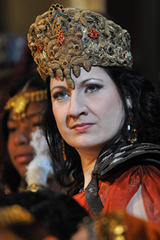| Opera Reviews | 25 April 2024 |
Thanks for coming, now get out of hereby Steve Cohen |
|
| Verdi: Nabucco Opera Philadelphia September 2013 |
|
|
Imagine! Consider how these foreign soldiers must have reacted to what was shown on stage as Verdi and the librettist Temistocle Solera turned a biblical story into a screed against the domination of Italians by foreign occupiers. The opera was telling the Italian people to show courage and throw off the tyranny of the Austrian Empire. It was an early manifestation of national fervor focused on unifying Italy and throwing out all foreign occupiers. Risorgimento, meaning the Resurgence, was the political and social movement that eventually united the different states of the Italian peninsula into the Kingdom of Italy. Nabucco shows the plight of the Jews as they are conquered and exiled from their homeland by King Nabucco (in English, Nebuchadnezzar.) Verdi was age 29 at the time. This, and most of his early operas, concerned the subjugation of one people by another, the independence of individuals and their love of liberty. This made him a hero within the movement. This historic impact aside, the intrinsic merits of this opera are modest. Its characters have little depth and the music is less accomplished than what Verdi would write a few years hence. Ernani two years later and Macbeth three years after that have better arias and much-richer development of characters and ensembles, to say nothing of his mature operas that followed. What Nabucco does have in abundance are choral numbers. The best-known is the chorus of the Hebrew Slaves, "Va, pensiero," which includes language about "my homeland, now lost to me." Even better is the chorus that follows which says: "Let the shackles around us be broken." The plot is 99% fictional. Some of it was invented by the author of the biblical Book of Daniel, who reported that Nebuchadnezzar went mad for a period of time during his reign. Actually, fragments from the Dead Sea scrolls say that it was Nebuchadnezzar's father, Nabonidus, who was smitten by God with a fever for seven years, while Nebuchadnezzar lived in good health until old age. He was king of the Babylonian or Assyrian Empire circa 605 BC to 562 BC. He constructed the Hanging Gardens of Babylon and also destroyed Judea's First Temple and deported Jerusalem's Jewish population to Babylon. When he died he was succeeded by Amel-Marduk. There's no record of him being deposed by any woman similar to the opera's Abigaille. Most of the characters and their romantic and political machinations were made up by librettist Solera. Meanwhile, the music was formulaic. You know the expression "If it's cabaret, there has to be an encore." In operas of that era if there was an aria there had to be a follow-up cabaletta. Nabucco's arias hardly ever develop into duets, trios and ensembles in which each character expresses individual thoughts. Accordingly, it was clever of Thaddeus Strassberger, the director and designer, to create a production that displayed historic surroundings and mounted the opera as a period piece. Austrian soldiers paraded down the aisles while costumed ladies and gentlemen were ushered across the stage and prominently seated in two of the proscenium boxes. Strassberger's sets were towering in the elaborate spirit of Verdi's time. The Hungarian soprano Csilla Boross, as Abigaille, displayed an exciting voice that cut through the orchestra and chorus. Her high notes were thrilling, although when she descended in octave leaps or in scale passages there was weakness at the bottom. Sebastian Catana was a sympathetic Nabucco with a nice voice but he lacked the vocal or acting stature to indicate that he was the most powerful man on earth. When his character broke down and sang that he was a ghost of what he once was, I wished that Catana could have indicated that by singing in a haunting half-voice. Morris Robinson was unusually fine as Zaccaria, the high priest of the Hebrews, singing three bass arias with firm tones from the top to the bottom of his range. The tenor Adam Diegel, in his local debut, displayed a ringing voice; and the fine mezzo Margaret Mezzacappa and bass Musa Ngqungwana were excellent in their supporting roles of Fenena and the High Priest of Baal. Corrado Rovaris conducted with the lilt and swagger that the score asks for. |
|
| Text ©
Steve Cohen Photo © Opera Philadelphia |

 A
poster from the 1842 world premiere of Nabucco, on display in
the lobby of Philadelphia's Academy of Music, announces that members
of the Austrian military were entitled to reduced ticket prices if they
attended in their uniforms.
A
poster from the 1842 world premiere of Nabucco, on display in
the lobby of Philadelphia's Academy of Music, announces that members
of the Austrian military were entitled to reduced ticket prices if they
attended in their uniforms.





